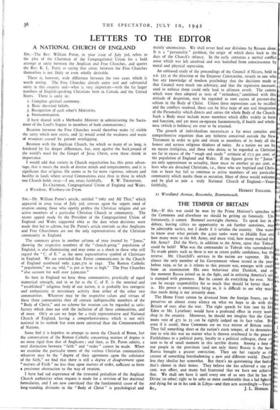SIR,—Dr. William Paton's article, entitled " 1662 and All That,"
which appeared in your issue of July 3rd, stresses again the urgent need of reunion among those who openly profess the Christian religion and are active members of a particular Christian Church or community. The recent appeal made by the President of the Congregational Union of England and Wales suggested 1662 as the date when decisions were made that led to schism, but Dr. Paton's article reminds us that Anglicans and Free Churchmen are not the only representatives of the Christian community in England.
The summary given in another column of your journal by " Janus," showing the respective numbers of the " church-going " population of England, is also illuminating and may come as a shock to those who still regard the " C. of E. " as the most representative symbol of Christians in England. We are reminded that Easter communicants in the Church of England numbered only 2,391,370 in t941. The Roman Catholic " population," we are told, " is put at least as high." The Free Churches " also account for well over 2,000,000."
So here in England we have three communities, practically of equal numerical strength, and in so far as the C. of E. is the nominal and " established " religious body of our nation, it is probably less energetic and enthusiastic in missionary activity than either of the other two communities. Whatever may be the respective values and virtues of these three communities they all contain indispensable members of the " Body of Christ," and no scheme for reunion can be regarded as satis- factory which does not seek the inclusion of all these communities, and of more. On'y so can we hope for a truly representative and National Church of England, having a comprehensiveness which is not only national in its outlook but even more universal than the Commonwealth of Nations.
Some feel it is hopeless to attempt to move the Church of Rome, but the conservatism of the Roman Catholic concerning matters of dogma is no more rigid than that of Anglicans ; and then, as Dr. Paton admits, a total distinction between " faith " and " order " cannot be made. When we examine the particular tenets of the various Christian communities, whatever may be the " degree of their agreement upon the substance of the faith," we find that there is still a degree of disagreement upon " matters of Faith " no less than upon matters of order, sufficient to form a persistent obstruction to the way of reunion.
I have had sad experience of the irrational prejudices of the Anglican Church authorities when request is made for a revision of her doctrinal formularies, and I am now convinced that the fundamental cause of the long-standing divisions in the " Body of Christ " is psychological and
mainly unconscious. We shall never heal our divisions by Reason alone. It is a " personality " problem, the origir of which dates back to the days of the Church's infancy. In the early. centuries a mental conflict arose which was left unsolved and was banished from consciousness by moral and physical repression.
An unbiased study of the proceedings of the Council A Nicaea, held in A.D. 325 at the direction of the Emperor Constantine, reveals to one who has any knowledge of modern psychology that the decisions made at that Council were much too arbitrary, and that the repressive measures, .1 used to enforce them could only lead to ultimate revolt. The canons which were then adopted as tests of " orthodoxy," combined with this attitude of despotism, may be regarded as root causes of present-day schism in the Body of Christ. Unless these repressions can be recalled and the conflicts resolved, there can be lithe hope of any real integration of the Personality which directs and unites the whole Body of the Church. Such a Body must include many members which differ widely in form and function, and yet must co-operate harmoniously, if health and whole- ness (which is holiness) are ever to be attained.
The growth of individualism necessitates a far more complex and comprehensive organism than any hitherto conceived outside the New Testament in order to gain and retain as members of its body all the honest and serious religious thinkers of today. As a nation we are by no means irreligious, and those who desire to be regarded as Christian are far in excess of the " rough and ready " estimate of 17.5 per cent, of the population of England and Wales. If the figures given by " Janus " are only approximate to actuality, there must be another so per cent. at least who are detached Christians, i.e., those who are baptised and Chris- tian at heart but fail to continue as active members of any particular community which marks them as sectarian. Most of those would welcome and be glad to join a truly National Church of England.—Yours faithfully, HERBERT ENGLAND.
r Woodland Avenue, Boscombe, Bournemouth.


























 Previous page
Previous page